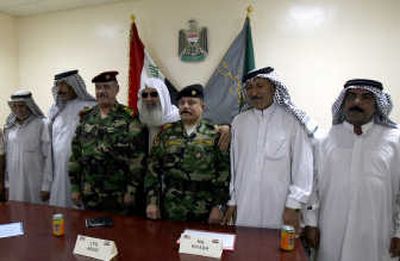Freed sheiks say they’ll keep fighting al-Qaida

BAGHDAD – It had to be done quickly. Rogue Shiite militiamen were holding hostage a group of Sunni and Shiite tribal sheiks who had joined a revolt against al-Qaida. For the Iraqi government and its U.S. backers, the seven men represented a rare symbol of national unity.
A daring rescue operation secured their freedom.
A meeting Tuesday between most of the former captives and military officials – including the Iraqi commander of the rescue operation – offered the first detailed picture of the tense and fast-moving events: the kidnapping, the slaying of one captive and the seven-hour rescue mission Monday converging on an area that was “not fit for rats.”
The sheiks, recounting their 30-hour ordeal to a small group of reporters including the Associated Press, said they were tortured and humiliated. At least three of the sheiks were visibly bruised. One man’s left eye was red and swollen. The two others had bruises on their backs, arms and legs.
But they insisted that they emerged from captivity more determined than ever to continue their fight.
“We already forgot the pain and the wounds from our ordeal,” said Haroon al-Mohammedawi, the bearded leader of the group from Khalis, a region in Diyala province where the terror organization has a heavy presence. “We pledge to you, the people and leadership of Iraq, that we will stay the course.”
Al-Qaida militants, the sheiks told Iraqi and U.S. commanders, had prevented food rations from reaching them for a year, cut off power supply to their villages and ruined their orchards.
“Al-Qaida has condemned us to death,” said al-Mohammedawi, a Shiite. “But we have a strong uprising and we have volunteers from the age of 14 to 75.”
The swift action to rescue the sheiks, launched by about 200 Iraqi soldiers and backed by the U.S. military, reflected the strategic importance of local reconciliation initiatives and the forging of alliances with Sunni tribes in areas where the terror network remains active.
The strategy was stunningly effective in several Baghdad neighborhoods, areas south of the capital known as the “triangle of death” and in the vast western province of Anbar, forcing al-Qaida militants to flee and reducing the levels of violence.
Failure to free the hostages would have dealt a blow to efforts to rally the residents of Diyala, a mix of Shiites, Sunnis and Kurds, behind the U.S. and Iraqi forces in the fight against al-Qaida.